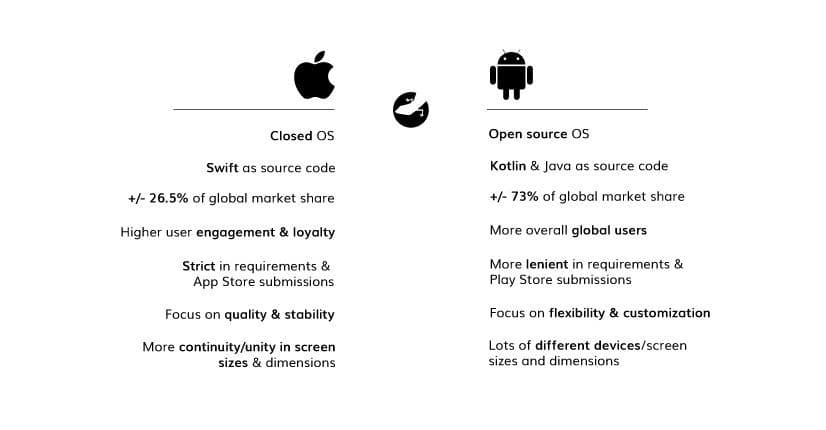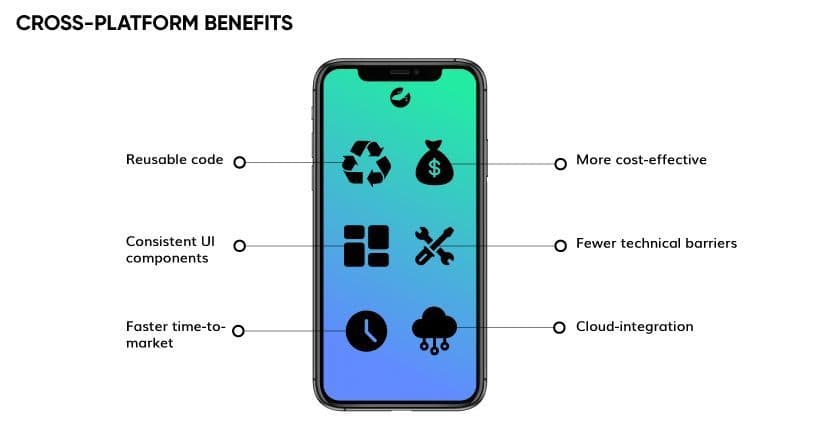native mobile apps
ios
+ 8 more ...
iOS or Android? How to Make the Best Decision for your Native App
09 Dec 2021
by Lotte, Digital Content Specialist
09 Dec 2021
by Lotte, Digital Content Specialist
native mobile apps
ios
android
platform specific
native features
swift
apple
mobile phone
app store
play store
iOS or Android? How to Make the Best Decision for your Native App
Table of contents
Contact us
We will get back to you in the next 48 hours.

Are you developing your app for Android or iOS? Or both? Before you pick, here’s what you need to know.
Mobile app development is one of the fastest-growing fields in the software development industry. As someone who’s planning to have your app developed, there are myriad choices to make regarding the technical specifications of your product. Do you want a web app or mobile app? And if you have your mobile app developed, do you want to make it available on Android devices or iOS? In this blog, we give you an insight into the differences between Android and iOS apps to help your choice a bit easier.
Different types of mobile apps
In one of our previous articles, we already made a distinction between different types of apps and their pros and cons
Native mobile apps
- Platform-specific, Google Native (Android) or Apple Native (iOS)
- High in performance, security and stability
- Efficient development and testing process thanks to native resources (SDKs)
- Costly if you want to target multiple operating systems
Cross-platform apps
- Single source code for multiple platforms
- Faster time-to-market, perfect for MVPs
- More budget-friendly than native apps
- Potentially lower in performance than native apps
Progressive web apps
- Accessible without installing/downloading
- Improved findability thanks to SEO
- Native-like quality
- Automatic updates
- Not accessible through app stores
Now that we have a basic understanding of the pros and cons of different types of mobile applications, we’ll zoom in on one particular type: the native mobile app. Imagine, you want to have a high-performance app, developed for one specific operating system. But which platform are you going for? Let’s dive into the differences between iOS and Android to find out which operating system suits your solution best.
Hey there! Are you as passionate about app development as we are? Are you experienced with the development of native, cross-platform or progressive apps and would you like to learn more about it in a hyper-innovative and international work environment? Then we might be looking for you! Check out our career page for more info on internship opportunities at Lizard Global!
Android vs. iOS: audience
Currently, the two most popular operating systems are Apple’s iOS and Google’s Android. Android and iOS combined make up for more than 99% percent of the global mobile OS market share in 2021, of which Android devices take up almost 73% and iOS devices 26.3%. Looking at those numbers, you might think Android development includes a bigger audience and therefore probably results in a bigger customer base and with that a more successful application.
However, the dominance of an operating system depends on more than just the number of users. Google’s Android has the biggest global share in lower-income areas and developing countries due to its broad price range and cheaper entry-level pricing point. So, in growing markets like Asia and Africa, it has an advantage over Apple. However, despite Google's global sales dominance, Apple’s iOS dominates the profit share as the average iOS user is more actively and steadily engaged than the average Android user and generally more likely to invest money in an app they like.

Android vs. iOS: device
The type of device and OS itself has a significant influence on the development process of your app. When creating your app, developers are dependent on the following factors:
Open or closed OS
Android has an open operating system, based on code from the "Android Open Source Project" or AOSP. The AOSP was established to ensure that an open source platform would always be accessible to innovate the app market. This means that developers can download the Android source code and modify it to their liking with much more flexibility than a closed OS, like iOS, where Apple has complete control over both the software and the hardware ecosystems.
Programming language
Native mobile applications are built with a platform-specific programming language. iOS applications are built using its own source code “Swift”, while Android apps are developed using “Java” or “Kotlin”. Before you start looking for a developer, you need to make sure that they are specialized in the right language, or experienced with both.
User interface
iOS has a very strict set of rules regarding what is allowed in terms of the user interface design. When developing for Apple, the interface design of your app needs to always be in line with the iOS style. Android, however, has much more flexible regulations regarding the design of your app, and includes a higher level of customization.
Screen size & resolution
Android runs on a broad collection of different devices, all with different screen dimensions and resolutions. This means that, when you have your app developed for Android, developers have to make sure that the design is responsive for all these screen types. On the other hand, iOS only runs on Apple devices, which consist of a much more limited line of products and therefore fewer screen sizes and resolutions.
Android vs. iOS: an overview
Taking all the above into account, let’s have a final look at the benefits of iOS apps and Android apps:
iOS
- Better per-user app revenue and overall greater potential financial ROI (return on investment) than Android apps
- Highly secured enterprise data
- High-quality standards
- Established and loyal customer base
- Optimal and stable user experience
- Tech-ready audience, more likely to adopt new technologies
- Ease of testing, low fragmentation
Android
- Flexible and suitable for BYOD (Bring Your Own Device)
- Highly customizable
- Complete integration of all Google services
- Easier entrance to Play Store than iOS
- Because of that, faster time-to-market
- Scope for innovation thanks to open source
Why not both?
Still struggling with choosing which platform to develop your app for? Perhaps you don’t even have to choose. As mentioned in the beginning of this blog, there are different types of applications, apart from native apps. If you want to have your app developed for both Android and iOS, but you don’t want to invest in two separate native apps, you might want to consider developing a cross-platform application.
There’s an ongoing debate about whether it’s better to develop one or more native mobile apps, or include all platforms with a cross-platform application. Both have their pros and cons, and the choice ultimately depends on your objectives and preferred outcomes. While native applications may have higher potential performance and stability, cross-platform development opens your app to a much broader audience by supporting multiple platforms at the same time with a single codebase. This way, you don’t simply reach a bigger audience, but you also achieve a much faster time-to-market. It is up to you to decide where your priorities lie.

Need a hand?
At Lizard Global, our technical specialists know exactly what type of technologies and platforms suit your solution best. Together with you, we dive into the ins and outs of your business, target audience, budget, and main objectives. With that information, we decide what application is the right one for you: a web application, cross-platform app, or native Android or iOS application. With you as the expert in your own industry and us as your plug-and-play development specialists, we can turn your market upside down with a revolutionary digital solution.
Do you want to know more about the different types of applications we develop, and which type of application suits you best? Fill out the contact form on our site and get started with a free consultation with one of our experts in the field!

Are you developing your app for Android or iOS? Or both? Before you pick, here’s what you need to know.
Mobile app development is one of the fastest-growing fields in the software development industry. As someone who’s planning to have your app developed, there are myriad choices to make regarding the technical specifications of your product. Do you want a web app or mobile app? And if you have your mobile app developed, do you want to make it available on Android devices or iOS? In this blog, we give you an insight into the differences between Android and iOS apps to help your choice a bit easier.
Different types of mobile apps
In one of our previous articles, we already made a distinction between different types of apps and their pros and cons
Native mobile apps
- Platform-specific, Google Native (Android) or Apple Native (iOS)
- High in performance, security and stability
- Efficient development and testing process thanks to native resources (SDKs)
- Costly if you want to target multiple operating systems
Cross-platform apps
- Single source code for multiple platforms
- Faster time-to-market, perfect for MVPs
- More budget-friendly than native apps
- Potentially lower in performance than native apps
Progressive web apps
- Accessible without installing/downloading
- Improved findability thanks to SEO
- Native-like quality
- Automatic updates
- Not accessible through app stores
Now that we have a basic understanding of the pros and cons of different types of mobile applications, we’ll zoom in on one particular type: the native mobile app. Imagine, you want to have a high-performance app, developed for one specific operating system. But which platform are you going for? Let’s dive into the differences between iOS and Android to find out which operating system suits your solution best.
Hey there! Are you as passionate about app development as we are? Are you experienced with the development of native, cross-platform or progressive apps and would you like to learn more about it in a hyper-innovative and international work environment? Then we might be looking for you! Check out our career page for more info on internship opportunities at Lizard Global!
Android vs. iOS: audience
Currently, the two most popular operating systems are Apple’s iOS and Google’s Android. Android and iOS combined make up for more than 99% percent of the global mobile OS market share in 2021, of which Android devices take up almost 73% and iOS devices 26.3%. Looking at those numbers, you might think Android development includes a bigger audience and therefore probably results in a bigger customer base and with that a more successful application.
However, the dominance of an operating system depends on more than just the number of users. Google’s Android has the biggest global share in lower-income areas and developing countries due to its broad price range and cheaper entry-level pricing point. So, in growing markets like Asia and Africa, it has an advantage over Apple. However, despite Google's global sales dominance, Apple’s iOS dominates the profit share as the average iOS user is more actively and steadily engaged than the average Android user and generally more likely to invest money in an app they like.

Android vs. iOS: device
The type of device and OS itself has a significant influence on the development process of your app. When creating your app, developers are dependent on the following factors:
Open or closed OS
Android has an open operating system, based on code from the "Android Open Source Project" or AOSP. The AOSP was established to ensure that an open source platform would always be accessible to innovate the app market. This means that developers can download the Android source code and modify it to their liking with much more flexibility than a closed OS, like iOS, where Apple has complete control over both the software and the hardware ecosystems.
Programming language
Native mobile applications are built with a platform-specific programming language. iOS applications are built using its own source code “Swift”, while Android apps are developed using “Java” or “Kotlin”. Before you start looking for a developer, you need to make sure that they are specialized in the right language, or experienced with both.
User interface
iOS has a very strict set of rules regarding what is allowed in terms of the user interface design. When developing for Apple, the interface design of your app needs to always be in line with the iOS style. Android, however, has much more flexible regulations regarding the design of your app, and includes a higher level of customization.
Screen size & resolution
Android runs on a broad collection of different devices, all with different screen dimensions and resolutions. This means that, when you have your app developed for Android, developers have to make sure that the design is responsive for all these screen types. On the other hand, iOS only runs on Apple devices, which consist of a much more limited line of products and therefore fewer screen sizes and resolutions.
Android vs. iOS: an overview
Taking all the above into account, let’s have a final look at the benefits of iOS apps and Android apps:
iOS
- Better per-user app revenue and overall greater potential financial ROI (return on investment) than Android apps
- Highly secured enterprise data
- High-quality standards
- Established and loyal customer base
- Optimal and stable user experience
- Tech-ready audience, more likely to adopt new technologies
- Ease of testing, low fragmentation
Android
- Flexible and suitable for BYOD (Bring Your Own Device)
- Highly customizable
- Complete integration of all Google services
- Easier entrance to Play Store than iOS
- Because of that, faster time-to-market
- Scope for innovation thanks to open source
Why not both?
Still struggling with choosing which platform to develop your app for? Perhaps you don’t even have to choose. As mentioned in the beginning of this blog, there are different types of applications, apart from native apps. If you want to have your app developed for both Android and iOS, but you don’t want to invest in two separate native apps, you might want to consider developing a cross-platform application.
There’s an ongoing debate about whether it’s better to develop one or more native mobile apps, or include all platforms with a cross-platform application. Both have their pros and cons, and the choice ultimately depends on your objectives and preferred outcomes. While native applications may have higher potential performance and stability, cross-platform development opens your app to a much broader audience by supporting multiple platforms at the same time with a single codebase. This way, you don’t simply reach a bigger audience, but you also achieve a much faster time-to-market. It is up to you to decide where your priorities lie.

Need a hand?
At Lizard Global, our technical specialists know exactly what type of technologies and platforms suit your solution best. Together with you, we dive into the ins and outs of your business, target audience, budget, and main objectives. With that information, we decide what application is the right one for you: a web application, cross-platform app, or native Android or iOS application. With you as the expert in your own industry and us as your plug-and-play development specialists, we can turn your market upside down with a revolutionary digital solution.
Do you want to know more about the different types of applications we develop, and which type of application suits you best? Fill out the contact form on our site and get started with a free consultation with one of our experts in the field!
FAQs

What is a native mobile app?
What is a cross-platform app?
What is a progressive web app?
What are the benefits of an iOS app?
What are the benefits of an Android app?
similar reads

Software Development
Appium vs Detox: Which to Choose in 2023 (Pros & Cons!)
16 June 2023

Software Development
Company Culture & Milestones
7 Best Signs Your App Is Not Converting in 2023 (& How We Solve Them!)
9 November 2023

Software Development
UI/UX & Product Design
Digital Conceptualization
Market Research
What Makes a Great App? 8 Powerful Features to Inspire You!
12 October 2023




